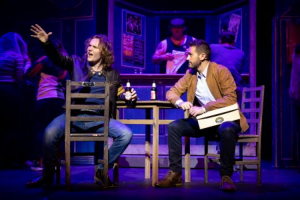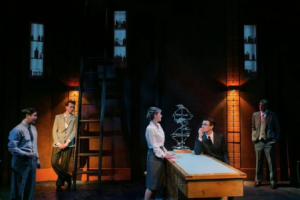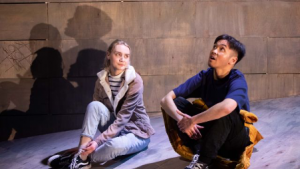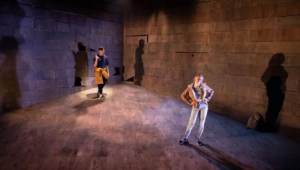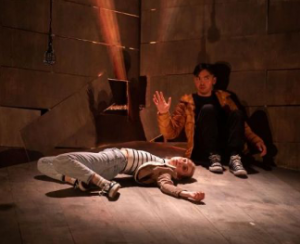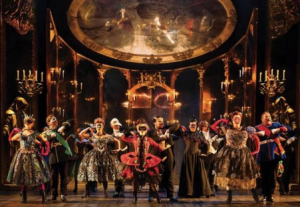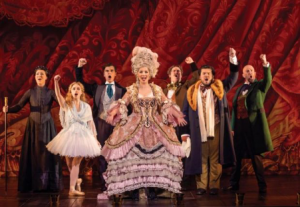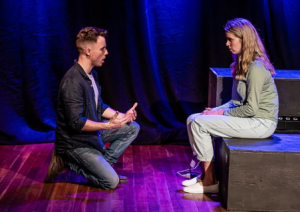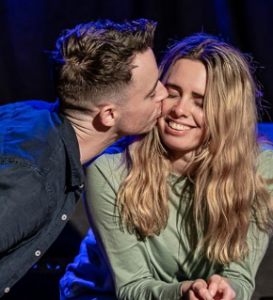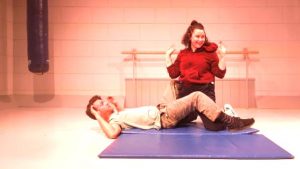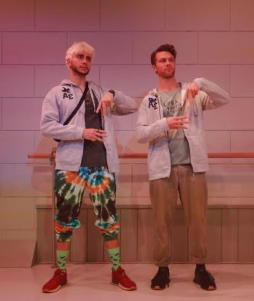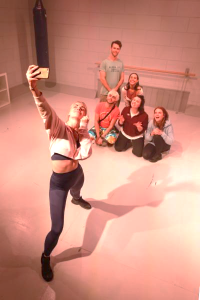By Jonathan Biggins. Hunters Hill Theatre Company. Director: Jasper Kyle. Club Ryde. 9-25 September, 2022.
Reviewed : September 18, 2022.
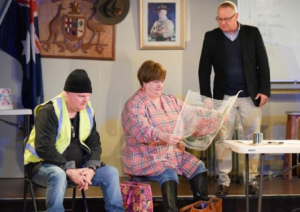
Hunters Hill’s production of Australia Day waited patiently during two years of restrictions to make its funny and irreverent appearance in this 2022 season. Funny because of playwright Jonathan Biggins’ ability to satirise everyday characters and situations; irreverent because his satire is, in the words of director Jasper Kyle, “highly provocative” – as satire usually is! In the well-known Wharf Revue, Biggins and his co-writers Drew Forsythe and Phil Scott lampoon politics and politicians, local and international. In Australia Day, the satire is more local, more personal and more telling.
Biggins sets his play in the imaginary town of Coriole. On a succession of monthly meetings six members of the local Australia Day Committee congregate in the Scout Hall to organise the annual Australia Day celebrations. The characters they represent might be found in any “committee’ or organisation anywhere – people who want to be involved for various reasons – not always altruistic! In this case there is an aspiring politician, a representative from the CWA, a green feminist, a redneck denialist and a token ‘new’ Australian.
As they inter-act, they provide what Kyle describes as “a wonderful mix of clashing progressive versus conservative ideologies”. Most members are happy for the event to stay the same – a parade, a concert featuring the school choir and local dance group, the introduction of new citizens and a sausage sizzle. The new, younger members are prepared to question and suggest some changes.

The chair of the committee is Brian, the local mayor, played by Martin Maling. Owner of the local hardware shop, Brian is seeking pre-selection for federal politics – and worried about an application by Bunnings to build locally. Maling plays Brian as arrogant, self-righteous, easily flustered and easily angered, turning often for support to the secretary of the Committee and fellow councilor Robert, played by Ross Alexander.
Robert is a much calmer person and Alexander shows this in his patient listening to opposing views and attempts to keep the peace. He listens a lot, shakes his head often, and intervenes when he thinks things are getting out of hand. He is a distinct contrast to Wally, the local plumber who is aggressively anti-everything: global warming, conservation, smoking ceremonies, migration. Wally is the ‘cringe’ character in Biggins’ play and Alan Long enjoys every moment of playing this ‘shock jock’ style character.
The two female characters are also poles apart. Maree is a stalwart of the CWA and comes to meetings equipped with her cross stitch and knitting. Renee Simon, in her debut on the stage, uses bustle and fussiness to accentuate Maree’s character when things get a little confusing, especially if it’s anything to do with new technology.

Helen, played by Cee Egan, is a single mother, a feminist and a Greenie, who bristles about anything that might appear to be racist or discriminative – including the sausage sizzle! Egan uses the feistiness of this character to try to push the pace of the production. She listens carefully and uses gesture and expression effectively to show her exasperation – and her deviousness when an opportunity arises to further her political ambition.
The new representative from the local school is Chester, a first generation Australian – Sri Lankan. Chester sees himself as a bit of joker, and Kirit Chaudhary makes the most of the quips and one-liners Biggins has given this character.
Kyle and his cast find the humour of the second act where everything that can possibly go wrong does! A bushfire, food poisoning, blocked portaloos, a little bit of bribery, a thunderstorm, and the arrival of a past prime minister!
This is a play that uses satirical humour to question what Jasper Kyle describes as the “uglier side of ourselves that we try to ignore and keep hidden”. By lampooning those characteristics, Biggins, Kyle and his cast bring them out of hiding and make us think about them carefully.
Also published in Stage Whisper magazine
